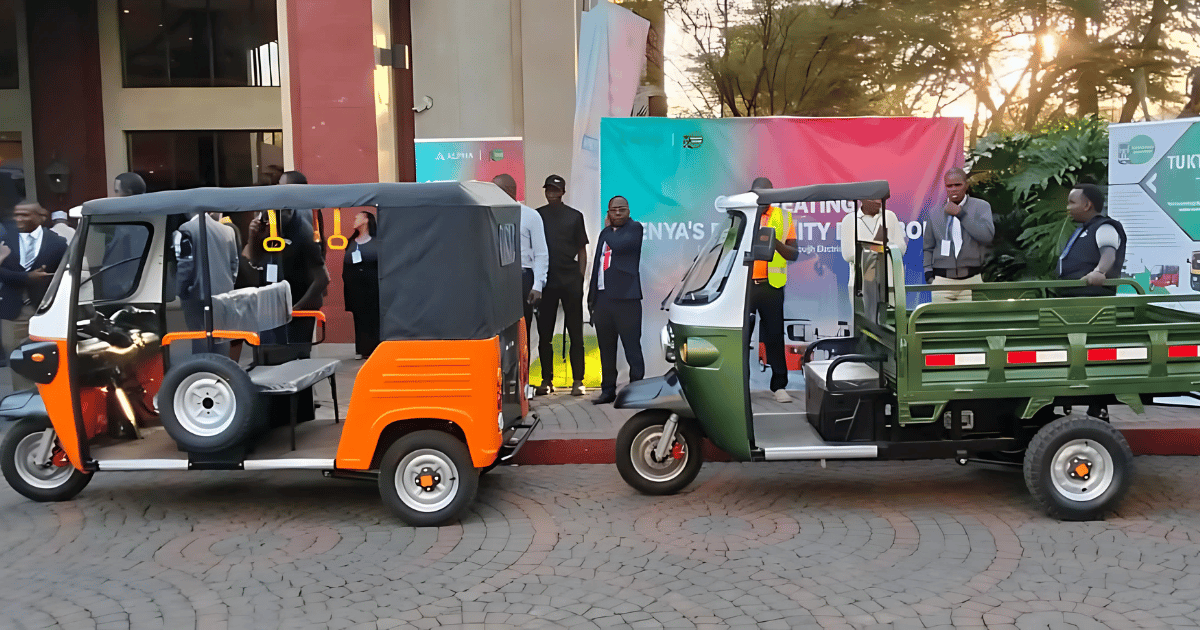- Mobility Rising
- Posts
- Canadian firm launches electric three-wheelers in Kenya
Canadian firm launches electric three-wheelers in Kenya

From the newsletter
Alpha E-Mobility, a Canadian company, has launched its electric three-wheelers in Kenya. It introduced passenger, cargo and ambulance three-wheelers. The vehicles are being assembled at the Kenya Vehicle Manufacturers (KVM) factory in Thika, with a target to make 3,000 units in 2026. The company is also in Tanzania, Nigeria, Ghana, Ethiopia and Egypt.
There are more than 200,000 three-wheelers in Kenya, but the vast majority run on fuel. EV companies are looking to disrupt this market with electric options.
The price of an electric three-wheeler in Kenya is about $9,300, more than double the cost of fuel vehicle. This is the main challenge for customers.
More details
The three-wheelers, commonly known as tuk-tuks in East Africa, have a range of between 100-130 km and come with swappable batteries that can also be charged at home. “Our tuk-tuks can be charged with grid electricity and also using a home solar system,” said Kinyar Karangi, the company’s Kenya business lead.
Alpha E-Mobility joins a handful of other companies in the electric tuk-tuk segment which continues to attract new players. Solutions Africa was one of the first companies to introduce electric tuk-tuks in Kenya, but has since been followed by other companies like Electric Tuk Kenya, Ana Green Tech Africa and Car & General, which sells Piaggio tuk-tuks.
Three-wheelers are a common mode of transport across Africa, where they are used to transport both passengers and cargo, mainly over short distances. They are increasingly popular as they have a larger carrying capacity than motorcycles and cheaper than four-wheel vehicles. They also are also better at navigating muddy rural roads in Africa than motorcycles and scooters, which is leading to increased demand.
While the majority of electric tuk-tuks being deployed in Africa are imported, mainly from China and India, local assembly is growing as OEMs look to cut costs. For example, Alpha E-Mobility will be making their vehicles at KVM, one of Kenya’s top vehicle assemblers. Local assembly is also taking root in other countries like Nigeria, Ghana, Tanzania and Ethiopia, which have vast three-wheeler fleets.
The electric three-wheeler market on the continent was valued at $75.65 million in 2024, and is projected to reach $194.65 million by 2032, growing at a 12.54% CAGR. But the entry of multinationals like Fiat could help fast-track the continent’s production of the vehicles. The company is making the Tris electric three-wheeler in Morocco, targeting the African and Middle Eastern markets.
In the short-term, fuel-powered three-wheelers are expected to continue to dominate sales as prices of electric versions remain prohibitive. However, prices of electric three-wheelers are expected to decline in the coming years as production technologies become more efficient. Further, as a significant share of the vehicles are used in rural areas, access to swapping and charging infrastructure in remote areas will be pivotal for increased adoption.
Our take
Contract manufacturing through companies like KVM can enable new EV companies to fast-track shifts to local production by eliminating the need for major upfront investments in production plants.
Because tuk-tuks are used heavily in short-haul transport, battery-swapping hubs will become essential to drive adoption, creating opportunities for energy-as-a-service models. Models that can be charged with home solar will also likely be popular.
Just like for electric motorcycles, availability of financing will be key for electric three-wheeler companies like Alpha E-Mobility. They should strike partnerships with asset financiers like M-Kopa, Watu Credit and Mogo to finance their customers.